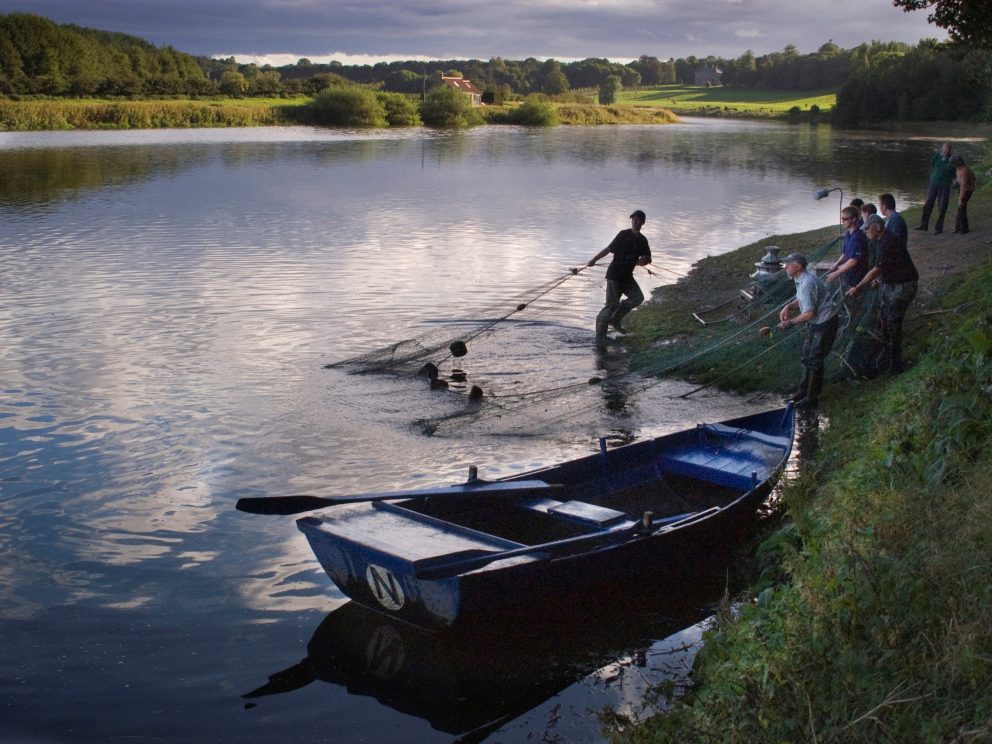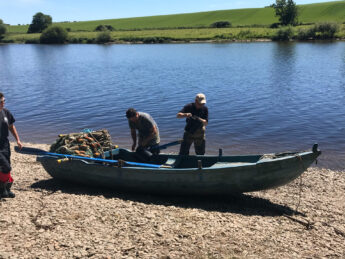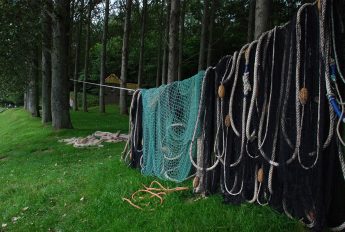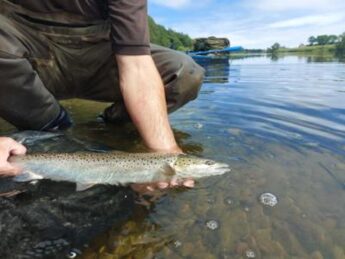Netting Salmon at Paxton

The river Tweed is the most productive salmon river in the UK with some of the highest populations of Atlantic salmon and sea trout in the country. At Paxton House, the River Tweed Commission run a specialist netting station which monitors the health and size of the fishery. Through the summer, visitors to Paxton House are invited to take a privileged view of the netting activity, stepping back into a past world when salmon fishing brought wealth to communities on the Tweed and in Berwick.
We are please to announce that after the vandalising of our nets, salmon netting at Paxton will resume on Thursday 4 July.
Following the salmon
Atlantic salmon are spawned in the upper reaches of the river, spend around 4 years growing in the clean fresh water of the Tweed before heading downstream and out to sea. In the sea, adult salmon range widely and, once mature, return to the river of their birth to spawn. Adult salmon in the river Tweed are not feeding but passing through, intent instead on reaching their spawning grounds and completing their life cycle.
Traditional fishing at Paxton
 At Paxton, the adult fish are caught in a net trailed between a traditional wooden rowing boat (coble) and a man walking down the bank, a practice followed here for centuries. Today, the salmon are landed, transferred to a holding tank, where they are weighed, measured and tagged before being returned to the water to continue their migration. The information gleaned helps the River Tweed Commission (RTC) learn the condition and numbers of fish and how long they have spent at sea. Tagged fish may be caught by anglers further up the river which also allows the RTC to monitor the impact of angling on fish stocks.
At Paxton, the adult fish are caught in a net trailed between a traditional wooden rowing boat (coble) and a man walking down the bank, a practice followed here for centuries. Today, the salmon are landed, transferred to a holding tank, where they are weighed, measured and tagged before being returned to the water to continue their migration. The information gleaned helps the River Tweed Commission (RTC) learn the condition and numbers of fish and how long they have spent at sea. Tagged fish may be caught by anglers further up the river which also allows the RTC to monitor the impact of angling on fish stocks.
Salmon populations in Trouble
 Although the river Tweed is proving an important stronghold for salmon and sea trout in Britain, populations of both fish in our rivers have been in sharp decline since the 1970s. The work undertaken by the River Tweed Commission at Paxton House is proving vital in providing up to date information to aid planning decisions. The data collected at Paxton helps determine why fish stocks are declining and devise strategies to maintain the quality of the water in the river, which is currently at an all time low.
Although the river Tweed is proving an important stronghold for salmon and sea trout in Britain, populations of both fish in our rivers have been in sharp decline since the 1970s. The work undertaken by the River Tweed Commission at Paxton House is proving vital in providing up to date information to aid planning decisions. The data collected at Paxton helps determine why fish stocks are declining and devise strategies to maintain the quality of the water in the river, which is currently at an all time low.
How it once was
The Paxton Netting Station is the last survivor of 84 netting stations on the river Tweed which operated at the peak of the netting industry in the late 18th century, when it employed as many as 300 people. It is a rare privilege to be able to see this traditional fishing activity being re-enacted for conservation purposes at Paxton.
Check dates and times for Netting for Salmon in 2024. Please note that the times are dependant on tides and may take place in the evening.
Read more about the fascinating history of the salmon industry on the Tweed.
